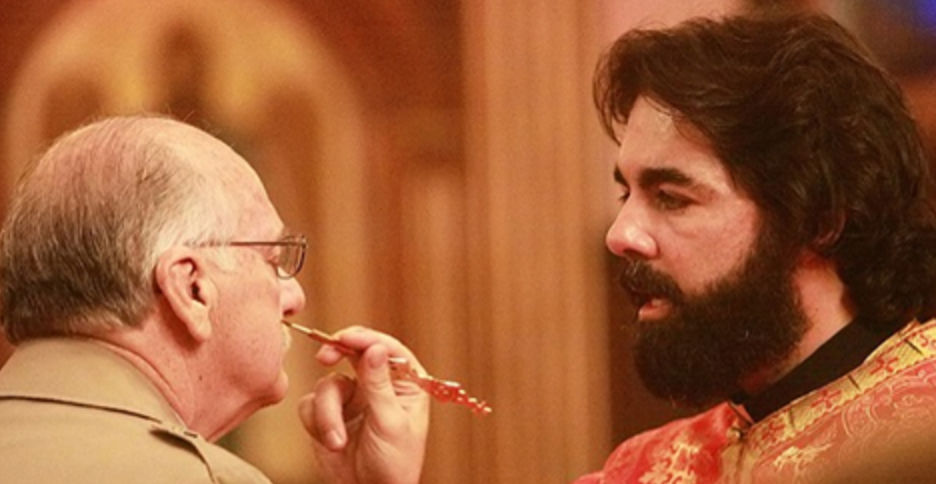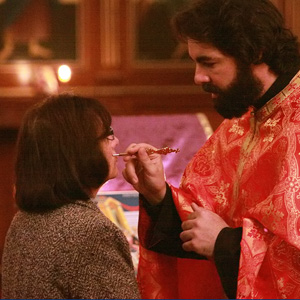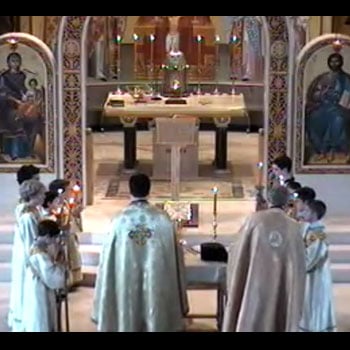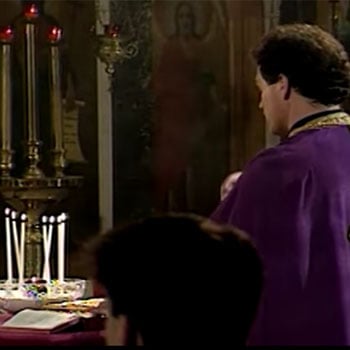We have begun our journey through Great Lent, and soon it will culminate with the services of Holy Week, itself a journey that culminates in the celebration of the Resurrection of Christ. On Wednesday of that week, we have the opportunity to receive the sacrament of Holy Unction, a service of prayers for healing, which is founded on James 5:14-16: “Are any among you sick? They should call for the leaders of the church and have them pray over them, anointing them with oil in the name of the Lord. The prayer of faith will save the sick, and the Lord will raise them up; and anyone who has committed sins will be forgiven.” This is a beautiful service for the whole family, utilizing all the senses that provide a memorable experience for children.
While Holy Unction is available at any time of the year, its position in Holy Week is significant. Bridegroom Matins calls for vigilance as we approach the passion of Christ, that we not be found sleeping, as we prepare for the Resurrection. Like the wise virgins, will our lamps be trimmed with oil, ready to meet the Bridegroom at the wedding feast? After these services comes Holy Unction, which shows this sacrament to be an integral part of our preparation to receive Christ.
For this reflection, I want to use the model of one mother’s experience of seeking healing—Lynette Hoppe, an OCMC missionary to Albania with her husband, Nathan, and their children Tristan and Katherine. Lynette was diagnosed with stage 4 breast cancer in November, 2004, and twenty months later, she fell asleep in the Lord. Her journal during her illness records how she confronted death, prayed for healing and trusted in God’s mercy. I would like to share some quotes from her journal, which are in the book Lynette’s Hope (ed. Fr. Luke Veronis, Conciliar Press).
Lynette tells of a recurring daydream that expresses her experience vividly: “I would walk out on a narrow stone bridge that spans a chasm and suddenly find that the bridge has vanished. Although I don’t fall, I’m left suspended with no support and no ability to move to safety. As I begin to panic, I hear a voice saying, ‘Look up.’ I look up and see a silvery rope coming down through the darkness. I grab on and am pulled to safety.” This is the way we also should approach Holy Unction, with total reliance on Christ’s saving power, reaching out for that “rope” of grace.
In Scripture and the Church’s teachings, the healing of soul is always included alongside the healing of the body. We see this when Christ first tells the paralytic, “your sins are forgiven” and after “take up your mat” (Luke 5:17-26). The second prayer of Holy Unction asks, “O merciful Master…take up Your abode in these, Your servants, who acknowledge their iniquities, and draw near to You in faith…forgiving them...and cleanse them from every sin…”
As Lynette started to focus on the healing of her soul, it bore much fruit. She wrote, “I see so much healing occurring in my soul […] Areas in my life that I didn’t even suspect needed healing have been touched at a depth that makes me gasp with wonder […] Whatever may lie ahead, I embrace it with thankfulness, for I have been so deeply blessed and touched.” In the same way, our expectations from Holy Unction should be directed toward our spiritual needs as much as any physical need, and we should not let a state of physical health blind us to our soul’s need for healing. This spiritual healing is the very essence of our journey through Lent.
These reflections help us define healing and what we seek from the sacrament of Holy Unction, but there is a responsibility that follows. In Metropolitan Anthony Bloom’s sermon on healing, he says, “To be healed does not mean to become whole only in order to go back to the same kind of life that we lived before; it means to be whole in order to begin a new life . . . Are we capable of receiving healing? Do we agree to take upon ourselves the responsibility of a new wholeness, in order to enter again, and yet again, into the world in which we live, with knowledge of our renewal; to be light, to be salt?” The prayers of Holy Unction reiterate these responsibilities, that the healed person may “serve you with all thanksgiving, . . . pleasing you and abiding in your will.”
As Lynette envisioned the Kingdom of God and began to sense its reality and imminence in her life, someone wrote to her about the “borderland” she occupied. She reflected, “It struck me that even if I were to get well, I would want to live all of my life in that borderland—that place where one has sight of the great City of God and yet remains with a foot on earth. . . It would remind me that I am an exile and pilgrim here. My true home is in that Great City with God, and I must spend my life journeying to that city, doing all the good that I can along the way.” If we walk away from the sacrament of Holy Unction without this transformation—to go forth and serve, to live more intentionally in the presence of the Divine—we have not received the blessing that God intended.
Though Lynette did not ultimately receive a physical healing, her life was such a witness to God’s power and Christ’s Resurrection, especially in post-Communist Albania, a testimony of faith where many families had lost faith. It is the same hope in the resurrection and the healing of our brokenness—both spiritually and physically—that brings us to Holy Unction and its oil. When we receive this holy sacrament, we participate in God’s Divine realm, ask to be transformed by it, and bring its reality to the world. In our actions and in our faith, we declare, “Christ is risen! Truly, He is risen!”
Shannon Sakellariou has a Master of Arts degree from the University of Chicago School of Theology and a M.Ed. from DePaul University. She is married to Panayiotis and the mother of two daughters. They spent four years in Albania as OCMC missionaries and knew Lynette well. Currently, she teaches high school English in Boston.



